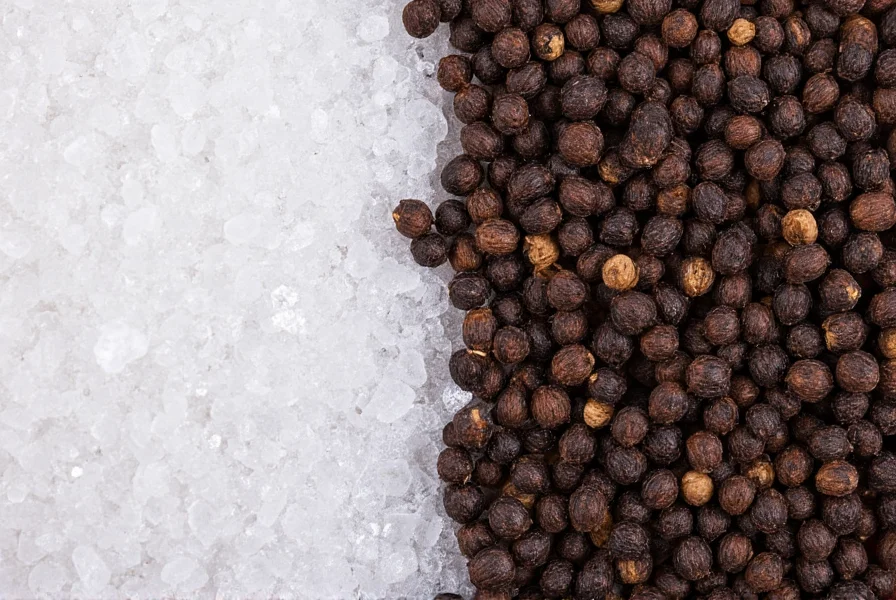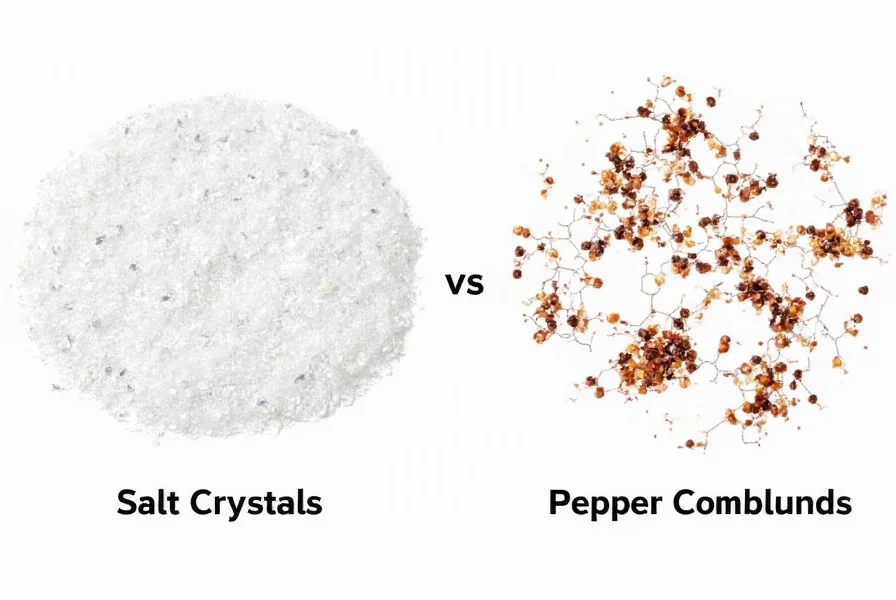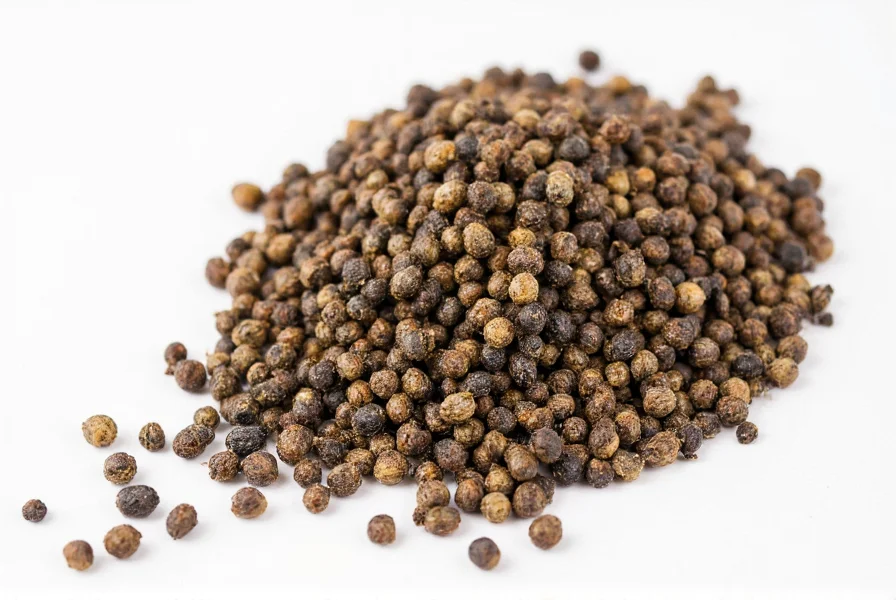Many people encounter the phrase 'salt and pepper' so frequently that they wonder if it represents a single seasoning compound. This common misconception leads to questions like 'how to get pepper from salt n pepper' or whether there's a way to extract pepper from this supposed mixture. The reality is straightforward: salt (sodium chloride) and pepper (typically black peppercorns, ground) are completely separate seasonings that are often served together but maintain their individual properties.
When restaurants place those familiar shakers on your table—one labeled 'salt' and the other 'pepper'—they're providing two distinct condiments. The phrase 'salt and pepper' has become so ubiquitous in culinary contexts that some mistakenly believe it refers to a single product. This linguistic shorthand has created confusion about whether pepper can somehow be separated or extracted from a combined 'salt n pepper' substance.

Understanding the Salt and Pepper Phrase
The expression 'salt and pepper' dates back centuries and refers to the traditional pairing of these two essential seasonings. In medieval Europe, salt was a valuable commodity often called 'white gold,' while pepper was so precious it was used as currency. Their pairing wasn't just practical—it was a status symbol. When recipes call for 'salt and pepper to taste,' they're instructing cooks to add both seasonings separately, not a pre-mixed compound.
Modern usage has shortened 'salt and pepper' to 'salt 'n' pepper' in casual speech and writing, which may contribute to the misunderstanding that it's a single entity. However, this contraction is merely linguistic convenience, not an indication of a combined substance. Just as 'fish and chips' doesn't create a new food item but refers to two separate components of a meal, 'salt n pepper' simply denotes two distinct seasonings.
Can You Actually Separate Mixed Salt and Pepper?
If you've accidentally combined salt and pepper into a single container, is there a way to separate them? While they can't be 'extracted' in the chemical sense since they're physically mixed rather than chemically bonded, there are practical methods to separate them:
| Separation Method | How It Works | Effectiveness |
|---|---|---|
| Static Electricity | Rubbing a plastic comb creates static that attracts lighter pepper particles | Moderate for small amounts |
| Water Solubility | Salt dissolves in water while pepper floats | High, but requires drying salt afterward |
| Size Separation | Using fine mesh to separate based on particle size differences | Low to moderate |
These methods work because salt and pepper maintain their individual physical properties even when mixed. Salt crystals are typically smaller and dissolve in water, while pepper particles are larger and hydrophobic. However, these separation techniques are generally unnecessary in culinary practice since most people keep salt and pepper in separate containers to begin with.
Why the Confusion Persists
The misunderstanding about 'extracting pepper from salt n pepper' likely stems from several factors:
- Linguistic shorthand: The frequent use of 'salt 'n' pepper' as a single phrase
- Product naming: Some pre-mixed seasonings use 'salt and pepper' in their names
- Visual similarity: When finely ground, both appear as white-to-light-gray powders
- Common pairing: They're almost always used together in cooking
Food manufacturers sometimes create 'steak seasoning' or other blends that include both salt and pepper plus additional ingredients, which might further confuse consumers about whether these are naturally occurring together.
Scientific Perspective on Salt and Pepper
From a chemical standpoint, salt (NaCl) and pepper (piperine-containing compounds) have completely different molecular structures:
- Salt: An ionic compound with a crystalline structure that dissolves easily in water
- Pepper: Contains organic compounds including piperine, which gives it heat and doesn't dissolve in water
These fundamental chemical differences explain why separation methods based on solubility or electrical properties can work. However, in normal culinary use, there's no need to separate them because they're typically stored and applied as distinct seasonings.

Practical Advice for Home Cooks
Understanding that salt and pepper are separate entities helps improve your cooking:
- Season incrementally—add salt and pepper separately to better control flavor balance
- Use freshly ground pepper for maximum flavor, as pre-ground loses potency quickly
- Remember that salt enhances flavors while pepper adds its own distinct heat and aroma
- When recipes specify 'salt and pepper,' they mean both seasonings to taste, not a pre-mixed ratio
Professional chefs emphasize the importance of treating these as individual seasonings rather than a single entity. As culinary expert Gordon Ramsay notes, 'Salt is for seasoning, pepper is for flavoring—they serve different purposes in the dish.'
Conclusion
The question of how to get pepper from 'salt n pepper' stems from a common misunderstanding of this culinary phrase. Salt and pepper are two distinct seasonings that are traditionally paired but remain separate substances. There's no extraction process needed because they're not combined at the molecular level—just physically placed together in many culinary contexts. Understanding this distinction helps improve your cooking technique and avoids unnecessary confusion about basic seasonings.
Can you actually separate pepper from a salt and pepper mixture?
Yes, salt and pepper can be physically separated using methods like static electricity (pepper is attracted to charged objects while salt isn't) or water solubility (salt dissolves in water while pepper floats). However, these methods are generally unnecessary since most people keep them in separate containers.
Is salt n pepper a single seasoning product?
No, 'salt n pepper' is not a single seasoning product but a common phrase referring to two separate seasonings that are typically used together. Some commercial products may combine them with other ingredients, but traditionally they are distinct seasonings.
Why do people confuse salt and pepper as a single entity?
The confusion stems from linguistic shorthand (saying 'salt 'n' pepper' as a single phrase), their frequent pairing in restaurants and recipes, and some commercial seasoning blends that use both ingredients. The contraction makes it sound like a single entity when it's actually two distinct seasonings.
What's the difference between salt and pepper chemically?
Salt (sodium chloride) is an ionic compound with a crystalline structure that dissolves easily in water. Pepper contains organic compounds including piperine, which gives it heat and doesn't dissolve in water. These fundamental chemical differences explain why separation methods can work.
Should I use salt and pepper together or separately when cooking?
Professional chefs recommend adding salt and pepper separately to better control flavor balance. Salt enhances existing flavors while pepper adds its own distinct heat and aroma. Adding them incrementally allows for more precise seasoning than using a pre-mixed combination.











 浙公网安备
33010002000092号
浙公网安备
33010002000092号 浙B2-20120091-4
浙B2-20120091-4